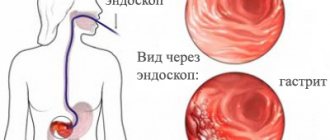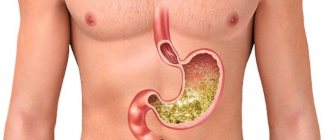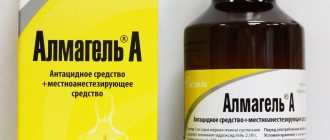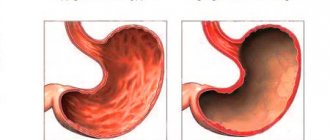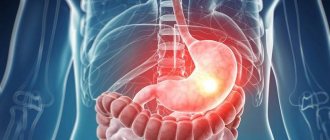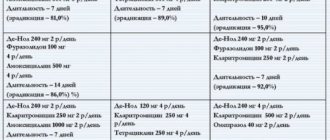Most of the adult population suffers from chronic diseases of the digestive tract. In the structure, the first place is occupied by inflammatory processes of the stomach and duodenum. Gastritis with high acidity is more common than other types of inflammation with impaired secretory function. The doctor is faced with the task of how to treat such a patient. Pathological changes are of a certain nature. Therefore, there are distinctive features of the symptoms and treatment with medications of a hyperacid state.
Causes
The main cause of gastritis with high acidity is infection with Helicobacter pylori. Repeated studies have proven a direct connection between the severity of inflammation of the gastric mucosa with hyperproduction of hydrochloric acid and the degree of bacterial invasion.
Helicobacter pylori is a bacteria with unique properties that can not only survive, but also actively reproduce in the stomach environment, which is aggressive for other microorganisms. They create an alkaline (ammonia) shell around themselves, which protects them from acidic gastric contents. At the same time, ammonia irritates the gastric mucosa, causing a decrease in somatostatin levels and an increase in gastrin secretion. As a result, the production of hydrochloric acid by parietal cells increases and the overall acidity of gastric juice increases. In addition, Helicobacter pylori directly affects the epithelial cells of the stomach, thereby triggering the inflammatory process.
Exacerbation of Helicobacter pylori infection can be provoked by:
- unhealthy diet (abuse of fried, fatty, spicy foods, dishes rich in extractive substances);
- smoking;
- alcohol abuse;
- food allergies;
- caffeineism (dependence on coffee, strong tea);
- taking certain medications (glucocorticoids, non-steroidal anti-inflammatory drugs);
- exposure to ionizing radiation;
- severe stress.
In addition to external ones, there are also a number of internal factors that provoke the development of gastritis with high acidity. These include:
- metabolic disorders (gout, thyroid disease, diabetes);
- severe chronic infectious and somatic diseases;
- hypoxia.
Often such gastritis develops against the background of other diseases of the gastrointestinal tract due to reflex and direct pathological effects. For example, with gastroduodenal reflux, the contents of the duodenum are thrown through the pylorus into the stomach. The bile it contains damages the gastric mucosa and contributes to the onset of inflammation.
The body has a powerful defense system that prevents damage to the mucous membrane by aggressive gastric contents. However, there are a number of factors that weaken this protective mechanism and thereby contribute to the development of gastritis with high acidity:
- hereditary predisposition;
- prolonged physical or mental fatigue;
- weakening of the body's defenses;
- occupational hazards.
Acute gastritis, what is it
It is worth noting that gastritis is individual in nature and manifests itself differently in each person. The disease can occur with low or high acidity. This means that rational treatment can only be prescribed by a doctor after a thorough examination. Taking medications on your own can have negative consequences.
The disease is characterized by unexpected and aggressive irritation of the intestinal mucosa. Naturally, this is influenced by foreign factors. If the doctor uses endoscopy, he will see many reddened cells. Also, the specialist may observe small surface tears, small areas of bleeding, and significant atrophy of epithelial cells. First of all, the functions of the stomach are disrupted, most often the secretory one.
Chronic gastritis
A long-term disease that is not so pronounced. The intestinal mucosa becomes thinner every day because normal cells are destroyed. One of the main types of cells is lymphocytes, which are responsible for the functioning of the immune system. In this form, the disease can even lead to stomach cancer.
The disease requires adequate treatment. You can use tablets, extracts, injections prescribed by a doctor. Countering inflammation, protecting the mucosa and eliminating acid are the main goals that need to be achieved.
Pathogenesis
Normally, the gastric mucosa has a powerful protective system that protects it from exposure to the aggressive gastric environment. However, under the influence of certain factors, protective barriers can be weakened, creating favorable conditions for the inflammatory process.
These factors include: constant physical and moral fatigue, various occupational hazards, hereditary characteristics of the body, weakening of the body against the background of severe concomitant diseases.
Gastroprotectors
Chronic gastritis must be treated with gastroprotectors. Protective drugs are:
- Venter;
- De-Nol;
- Biogastron;
- Hilak-Forte.
Medicines that restore the gastric mucosa have an enveloping effect, therefore they are prescribed for the treatment of acute gastritis. Gastroprotectors protect the digestive organs from bacteria, infections, toxins, and help normalize the intestinal microflora due to their effect on pathogenic substances. For acute and chronic gastritis, you can use gels or suspensions (Almagel, Phosphalugel) to prevent damage to the mucous membrane and relieve symptoms (heartburn, pain syndromes).
Symptoms and first signs
Previously, when the term gastritis with high acidity was simply mentioned, it was more often about superficial gastritis, reflux gastritis, erosive gastritis against the background of high acidity and Helicobacter pylori. But today, acidity is not an important diagnostic sign, and gastritis is classified according to the type of change in the mucous membrane into: atrophic, erosive and hypertrophic.
The most important symptoms of gastritis with high acidity:
- Nausea and vomiting - nausea most often occurs on an empty stomach, with long breaks in food, vomiting is characteristic of the erosive process. Vomiting occurs when a person with gastritis with high acidity has eaten too much acidic foods. In this case, it is the only option to reduce excess stomach acid.
- Bloating. With hyperacid gastritis, constipation predominates, against the background of which fermentation processes develop, causing bloating and gas formation.
- Aching pain in the epigastric region, in the left hypochondrium, sometimes cutting paroxysmal. Antral gastritis hurts in the right hypochondrium.
- Heartburn is the most characteristic symptom of gastritis with high stomach acidity.
- Sour belching is also a characteristic sign of increased acidity in the stomach; this symptom is distinctive, since with low stomach acidity (reduced secretory activity when food is poorly digested), the patient most often belches rotten (see Symptoms of low stomach acidity).
- Increased or decreased appetite. Usually, with superficial gastritis after eating, the acidity decreases slightly and causes an increase in appetite, but with acute gastritis or severe damage to the stomach, pain during and after eating naturally reduces appetite.
- Night pain and hunger pain - pain often bothers patients when there is no food in the stomach, that is, on an empty stomach, at night and after a long break in food.
In case of chronic gastritis with high acidity, the symptoms are not so pronounced and only with provoking factors:
- overeating;
- a long break from eating;
- alcohol abuse;
- food poisoning;
- severe stress;
- eating poor quality, too spicy, fatty, hot or cold food;
- when smoking.
They can cause exacerbation up to acute erosions or ulcers. Chronic gastritis is a long-term change in the mucous membrane and its exacerbation leads to acute gastritis of any severity.
Therefore, any change in the digestive process, which is expressed by nausea, pain, unstable stool, heaviness in the stomach, increased gas formation, should force a person to undergo examination by a gastroenterologist, since not only gastritis, but also more serious gastrointestinal diseases can cause similar symptoms, especially in our time oncological tension.
What drugs to treat gastritis
As noted above, the list of stomach pills for gastritis contains medications aimed at eliminating certain manifestations of pathology.
These are medications representing the following groups:
- Astringents that have a strengthening effect on gastric motility: Smecta, Almagel.
- Antiemetic drugs: Cerucal, Motilium.
- Carminatives that reduce increased gas formation: Espumisan, Simethicone.
- Antispasmodics: Drotaverine, Papaverine.
- Drugs that help increase the secretion of enzymes in the gastrointestinal tract: Panzinorm, Festal.
- Antibacterial agents aimed at destroying Helicobacter pylori: De-nol.
- Probiotics that improve the digestion process by restoring the natural intestinal microflora: Hilak, Bifiform.
- Remedies for gastritis of the stomach that reduce acidity: Ranitidine, Omez.
- Drugs that have a protective (enveloping) effect on the walls of the stomach: Phosphalugel, Maalox.
- Hepatoprotectors – agents that restore normal liver function: Karsil, Gepabene.
- Antibiotics for eradication of Helicobacter pylori: Tetracycline, Ampicillin.
Chronic gastritis is a disease whose symptoms are expressed by fairly general manifestations (flatulence, fatigue, minor stool disorders), which makes timely diagnosis of the pathology difficult. However, the symptoms of hyperacidity and hypoacidity disease differ significantly, as does their treatment.
Complications
With severe damage to the middle third of the stomach and high acidity, signs of pernicious, folic acid and iron deficiency anemia are observed. With a long course of untreated hyperacid gastritis, erosions form on the mucous membrane, followed by progression to gastric ulcer.
Long-term damage to the mucosa can lead to its atrophy and the development of atrophic gastritis, and subsequently to stomach cancer.
Disease prognosis
With timely treatment of gastritis, the prognosis is favorable; in the absence of treatment, complications and pathology may develop into a peptic ulcer of the duodenum or stomach.
List of references: https://abc-medicina.com/gastrojenterologija/gastrit-s-povishennoy-kislotnostu https://www.obozrevatel.com/health/bolezni/gastrit-s-povyishennoj-kislotnostyu.htm https://www .kp.ru/guide/kislotnost-zheludka.html https://mcprofessor.ru/med-wiki/zabolevaniya-po-alfavitu/gastroenterologiya/gastrit/gastrit-s-povyshennoy-kislotnostyu/med.vesti.ru/articles/ zabolevaniya/gastrit-simptomy-i-lechenie-u-vzroslyh/ https://www.passion.ru/diet/effektivnye-diety/dieta-pri-gastrite-s-povyshennoy-kislotnostyu-86518.htm Nutrition for gastric diseases, Ilya Melnikov 2009 https://fitosila.ru/lechenie-kislotnost https://20gp.by/informatsiya-dlya-posetitelej/354-pitanie-pri-gastrite-chto-i-kak https://health.mail .ru/disease/gastrit/ Home medical encyclopedia. Symptoms and treatment of the most common diseases. T. N. Albova 2010. Notes from the author of the article, based on personal experience. This material is purely subjective and is not a guide to action. Only a qualified specialist can determine an accurate diagnosis and prescribe treatment.
Last modified: 06/20/2020
Diagnostics
The following laboratory and instrumental research methods are used for diagnosis:
- gastric intubation with sampling of gastric juice - a tube is inserted into the stomach through which a portion of gastric juice is taken, then the concentration of hydrochloric acid in it is determined in the laboratory;
- pH-metry – determination of acidity directly in the stomach cavity;
- fibroesophagogastroduodenoscopy (FEGDS) - using a fiber optic tube with lighting and a camera, you can directly see the condition of its mucous membrane.
When the first symptoms of gastritis appear, you should consult a gastroenterologist for additional examination and adequate treatment.
How to treat?
After consultation with a doctor, gastroscopy and establishment of an accurate diagnosis, treatment for gastritis with high acidity is prescribed.
First of all, this is, of course, diet. A person must follow dietary recommendations for quite a long time. Ideally, you should always eat food that is right for your stomach—not rough and warm. Food must be chewed thoroughly. Spicy foods, spices, strong meat broths, and carbonated drinks should be excluded. It is important to avoid smoking and alcohol - they lead to the formation of excess hydrochloric acid, which worsens the condition of the mucous membrane.
After recommendations on proper nutrition, special medications are prescribed that help reduce acidity in the stomach. Drugs that restore the gastric mucosa are prescribed in a course.
After its completion, if you follow the rules of nutrition and maintain a healthy lifestyle, everything should work out.
Antihistamines
Autoimmune, atrophic, erosive forms of the disease require the use of antihistamines designed to reduce the amount of biogenic compounds. Histamine destroys the gastric mucosa due to its high content in the body. Elevated levels may be due to an allergic reaction to the drugs used. The best antihistamines are:
- Famotidine;
- Cimetidine;
- Twegil;
- Suprastin;
- Loratadine.
Drug treatment
Drug treatment for the treatment of serious gastrointestinal pathologies is considered the most preferable, because it will not be possible to cope with the pathology using home methods, you can only alleviate the symptoms.
- Typically, the effect of drugs in case of high acidity is aimed at neutralizing it, i.e. the drugs have an antacid effect.
- Antimicrobial agents that destroy Helicobacter are also prescribed. As additional therapy, drugs based on medicinal extracts that have anti-inflammatory and analgesic effects are prescribed (Iberogast, etc.).
- Antibiotic drugs that are resistant to the hyperacid gastric environment are sometimes prescribed. This category of medications is characterized by the presence of a considerable number of adverse reactions, so they should not be taken for a long time. Drugs like Amoxicillin, Clarithromycin, Metronidazole or Amoxiclav, Tetracycline, etc. are often prescribed.
- The use of antisecretory agents that inhibit hydrochloric acid production is also indicated. You cannot take such drugs for a long time, otherwise they can provoke atrophic inflammation of the gastric mucosa. Popular drugs in this group: Omizak and Losek, Cerol or Rabeprazole, etc.
- Antacids are also often included in the complex of medications for gastritis. These drugs create a protective film on the walls of the organ, which protects the mucous membrane from the aggressive effects of acids. Popular drugs in this group: Bisnol and Vis-Nol, Gastal and Phosphalugel.
Usually, for gastritis with high acidity, a traditional treatment regimen is used - eradication, which lasts 2 weeks and has an eradicating nature of Helicobacter. It is suggested to use two types of antibiotics and proton pump inhibitors, and sometimes metal salts are additionally prescribed.
See also: treatment regimen for Helicobacter pylori at home.
Physiotherapeutic treatment
This treatment allows you to enhance the effect of medications or deliver them directly to the stomach.
Electrophoresis with antispasmodics relieves pain and improves gastric motility. This is also facilitated by applying heating pads and thermal applications to the stomach area. Electrotherapy and magnetic therapy not only reduce pain, but also accelerate the healing of the mucous membrane.
Sanatorium-resort treatment is provided in the period between exacerbations, including therapy with mineral waters (hydrotherapy).
Contraindications
General contraindications for taking most tablets for gastritis are childhood, individual intolerance to individual components of the drugs, lactation or pregnancy. If you have serious problems with your liver or kidneys, you should consult your doctor. The specialist will select safe analogues of medications or adjust the dosage regimen.
Gastritis during pregnancy requires special treatment regimens. In some cases, doctors delay drug treatment until after the baby is born.
Diet for gastritis with high acidity
It is impossible to imagine complete treatment of gastritis with high acidity without following a diet.
The main rule is to eat food in small portions, but often. There should be about 6-7 meals per day. It is allowed to eat food only warm (not cold or hot). You should definitely avoid drinking alcoholic beverages, spicy and salty foods, sour fruits, rich meat broths, and fatty meats. If the condition worsens, the patient needs to eat only porridge with water and mashed potatoes.
Gastritis, which occurs with high acidity, requires a balanced, fortified and fractional diet.
What not to eat if you have gastritis with high acidity
Since we are considering gastritis with increased acidity of gastric juice, we need to exclude from the diet all foods that can increase this very acidity. In addition, it is strictly forbidden to include the following products in the menu:
- having an effect that stimulates fermentation processes;
- poorly digestible in the stomach;
- provoking increased production of gastric juice;
- having an aggressive effect on the gastric mucosa.
Products that actively affect the processes of gastric juice production :
| Name | Description |
| Citrus. | Oranges, tangerines, lemons and, in general, all fruits belonging to the citrus group are strictly forbidden to be eaten if the acidity of the gastric juice is high. They contain a large number of various organic acids - they provoke increased secretion of gastric juice |
| Kiwi. | This fruit, which has a sweet and sour taste, has a beneficial effect on the process of regeneration of tissues and mucous membranes. But it is precisely when the acidity of the gastric juice is high that kiwi should be abandoned - the acids it contains will certainly have a detrimental effect on the condition of the gastric mucosa. |
| Garlic. | This product contains a lot of phytoncides - they increase appetite and stimulate increased production of gastric juice. |
What can trigger the development of fermentation processes in the stomach :
| Name | Description |
| Grape. | It contains a lot of useful substances, but is distinguished by a thick peel - this is what provokes fermentation processes in the stomach. Doctors clarify that if you eat grapes without the skin, then nothing bad will happen. |
| Millet, corn, pearl barley and legumes | These products, even after heat treatment, contain coarse fibers - they provoke fermentation processes in the stomach. |
What has an aggressive effect on the gastric mucosa :
| Name | Description |
| Ice cream. | This delicacy contains a large number of flavorings, preservatives, dyes - in general, there are a lot of chemicals in ice cream. And all of them, combined with the low temperature of the product, have an extremely negative effect on the gastric mucosa. |
| Nuts. | In general, doctors recommend introducing this product into the diet of patients with the disease in question, but in strictly limited quantities. It is the large number of consumed nuts (of different varieties) that provokes an exacerbation of gastritis. |
| Chocolate, coffee and cocoa. | Despite their excellent taste, these products should not be eaten if the acidity of the gastric juice is high - the caffeine contained in them provokes the development of reflux (spontaneous release of stomach contents into the esophagus). |
There is a category of foods that, in principle, can be eaten for gastritis with high acidity. But they are very poorly digested in the stomach, which leads to fermentation processes and provokes an increase in acidity levels .
These products include:
| Name | Description |
| Liver of birds and animals. | It contains a lot of cholesterol - this already causes a decrease in the production of hydrochloric acid. When the liver exits the stomach into the intestines, severe irritation of the walls of the hollow organ occurs. |
| Smoked meat products, duck, goose and pork. | The listed varieties/types of meat contain a very large amount of fat - it is they that suppress the production of hydrochloric acid. But despite everything, they practically do not stay in the stomach, they enter the intestines almost in their original form - this aggressively affects the mucous membrane, irritating it. |
| Watermelon and melon. | Despite the apparent safety of these fruits, you need to remember the high content of fiber and fibrous particles in their composition. This is precisely what necessitates the need to limit the amount of melons and watermelons consumed (in any form - salted, jam, mousses, and so on). |
| Dumplings. | This product almost always causes heartburn and a feeling of heaviness in the stomach in people diagnosed with gastritis due to high acidity. It is noteworthy that boiled dough and lean minced meat can be consumed separately as part of a diet for the disease in question. |
A well-designed menu can help cope not only with the symptoms of the disease in question, but also with disturbances in metabolic processes - this inevitably leads to weight loss for the patient.
What can you eat if you have gastritis with high acidity?
The diagnosis of gastritis with high acidity is made only after a complete examination of the patient - this is carried out in a medical institution. If the disease in question has become chronic, then patients will complain of severe pain between meals and heartburn. The purpose of dietary nutrition for gastritis with high acidity is to prevent the development of the above syndromes.
What is allowed to eat for gastritis with high acidity:
| Name of the dish | Description |
| Soups. | They should be cooked only with water, milk or vegetable broth. As an additive, you can use small pasta, cereals and various vegetables. It is advisable to eat first courses pureed; pureed soups are an ideal option. |
| Side dishes. | Porridge, vegetables, and pasta are allowed. But porridges should be viscous, vegetables should only be boiled, stewed or steamed, pasta should be of the highest quality. |
| Second courses. | It is allowed to include steamed and oven-baked fish and meat dishes in the menu. If remission lasts a long time, then you can prepare these products by frying, but they should be eaten without an appetizing crust. |
| Snacks. | It is understood that a patient with diagnosed gastritis with increased acidity of gastric juice can be introduced into the diet with salads from fresh and boiled vegetables, cold meat and fish snacks (foods should be baked or boiled), dairy sausages and mild cheeses. |
| Bakery products. | You can eat wheat bread, but it must be dried; for baked goods, dry cookies and buns made from soft dough are allowed. |
| Dairy products and milk. | It is recommended to consume yoghurts and cottage cheese, sour cream and fermented baked milk without high percentages of fat content and berry and fruit additives. Whole milk can be included in the diet, but in extremely limited quantities. |
| Berries and fruits. | But an exception must be made for sour varieties - they will provoke increased secretion of gastric juice, which in turn leads to a more intense manifestation of pain and heartburn. |
| Fats. | The diet should contain vegetable oils (sunflower, olive, corn and others) and butter in limited quantities (for example, as an additive to viscous porridges or pasta). |
Doctors recommend that patients with gastritis with high acidity consume honey, but in a limited manner - in small quantities, this product has a beneficial effect on the gastric mucosa and reduces the level of acidity of gastric juice.
Nutrition during exacerbation of gastritis
The diet during the period of exacerbation of the disease in question may include:
- omelets made from chicken egg whites;
- puree soups on water without meat and fish;
- jelly from berries and fruits, rosehip decoction;
- steamed chicken or lean veal cutlets;
- viscous porridges cooked in water from buckwheat, rice or oatmeal (they must be crushed before cooking).
Only after 3-5 days, when the symptoms of exacerbation of gastritis with high acidity subside, will it be possible to add milk and meat broths to the menu - all exclusively with the permission of the attending physician.
How to treat stomach gastritis with drugs
Gastritis is most often treated conservatively, that is, without surgical intervention. The basis of recovery is diet and adherence to medication. The most important step is to eliminate the Helicobacter pylori bacterium. It is also very important to relieve symptoms (to get rid of pain and discomfort), after which it is necessary to stimulate the healing of the mucous membrane. Helicobacter pylori is a fairly “tenacious” bacterium that is resistant to antibiotics, so a combination of three or four drugs is prescribed to destroy it.
Gastritis is most often treated with a conservative method, that is, without surgical intervention. In case of bleeding, physiotherapy and laser therapy are prescribed, which have a good effect on the mucous membrane. The patient needs to adhere to fractional nutrition (5 meals in small portions) to reduce the load and the likelihood of mechanical damage to the stomach. You will have to exclude too hot and cold foods, give up fried, fatty, salty, spicy, sour, alcohol and other things. Your menu should be as simple as possible.
To achieve remission, patients are prescribed complex treatment, the dosage and duration of which depends on the type of gastritis, its stage and neglect. Approximate treatment of gastritis:
Antibacterial drugs
Clarithromycin, Amoxicillin, Metronidazole, Trichopolum, Tetracycline
Prescribed, as a rule, for 10-14 days. At the same time, to combat Helicobacter bacteria, it is recommended to reduce tobacco consumption for an accurate analysis result.
Antacids
Phosphalugel, Rutacid, Almagel Neo, Rennie, Gastal, Maalox
Their main task is to neutralize gastric acid. Once in the body, they envelop the stomach and relieve pain. However, these remedies are not intended for long-term treatment, but only to relieve symptoms, since after the cessation of action, the acid returns again. A side effect may be constipation.
Proton pump inhibitors-PPIs
Omeprazole, Emanera, Nexium, Gastrozol, Orthanol, Nolpaza, Controloc, Sanpraz They have a long-term effectiveness than antacid drugs, although they do not give an immediate effect.
They slow down the secretion of acid and allow the affected tissues to heal. It is advisable to take calcium supplements, as PPIs reduce its functioning in the body. The dosage and course duration of each drug are prescribed strictly by a gastroenterologist. Self-appointment is unacceptable. What should you consider when treating gastritis? Of course, self-medication is unacceptable under any circumstances. It is necessary to conduct a full examination, on the basis of which a specialist will select the correct therapy.
Folk remedies
Among folk remedies for gastritis with high acidity, gastric preparations are considered quite useful. They have a lot of different variations.
For hyperacid gastritis, it is necessary to select herbs that will reduce the secretion of hydrochloric acid and have an astringent and enveloping effect. The most suitable herbs are yarrow and dill, St. John's wort and burdock root.
You can buy a ready-made mixture at a pharmacy or prepare it yourself at home. Here are some examples of recipes:
- A large spoon of nettle leaves is placed in a saucepan and poured with a glass of water. Bring to a boil and leave for another half hour. The finished infusion is filtered and taken in a small spoon.
- Mix chamomile, yarrow and St. John's wort, three small spoons each, and add a spoonful of celandine. The mixture is steamed with boiling water (1 cup) and left for an hour. Then the infusion is divided into three equal parts and drunk half an hour before meals.
- Yarrow, St. John's wort and chamomile are mixed in equal parts. Take two large spoons of this mixture and pour half a liter of boiling water. Leave to infuse in a thermos overnight.
You can also try other popular folk recipes at home:
- Licorice root tincture - you can purchase it ready-made at any pharmacy. Take a teaspoon 3-4 times a day half an hour before meals. You can also purchase syrup that does not contain sugar.
- Copper water – dissolve a teaspoon of honey in a glass of water, then drink before each meal. You can also replace honey with 20-30 drops of propolis. The duration of therapy should be 1.5 months.
- Potato juice – drink juice from 3 medium-sized potatoes every morning. At the same time, keep in mind that the tubers are fresh and not stale. You need to drink the product in the morning, immediately after waking up. The duration of treatment is 10 days, after this time the acidity of the stomach drops significantly, due to which the manifestations of pathology are reduced.
- Sea buckthorn oil is one of the most effective methods for treating gastritis with high acidity. To do this, you need to take one teaspoon of this medicine 5-10 minutes before meals. The duration of treatment is 4 weeks; if you take longer, an allergic reaction may occur.
- Linden blossom decoction – this remedy has a powerful anti-inflammatory effect. Take 1-3 tablespoons of linden, pour a glass of boiling water over them and leave for an hour to infuse. Take 100 ml one hour before meals.
Before using any collection, you should definitely consult with a herbalist or gastroenterologist, otherwise self-medication may provoke an exacerbation of the pathological process.
How to help yourself at home?
A common cause of gastritis is excessive consumption of the following two substances:
- Aspirin (acetylsalicylic acid);
- Alcohol (ethyl alcohol, ethanol).
Aspirin and its analogues are prescribed by cardiologists for long-term daily and mandatory use to prevent myocardial infarction and stroke. Tens of thousands of people take aspirin daily as a means of inhibiting the formation of blood clots in the bloodstream, which makes the problem of the safe use of NSAIDs very urgent.
Acetylsalicylic acid preparations have excellent antiplatelet properties, that is, they prevent the development of blood clots in blood vessels. Blood clots are the main cause of myocardial infarctions and cerebral strokes. However, aspirin and other NSAIDs have unpleasant side effects - they irritate the mucous membranes of the gastrointestinal tract. Every day, hypertensive patients use these drugs in combination with other medications. Excessive intake of aspirin and its analogues can provoke an additional problem for a sick person - gastritis. This is relevant for all people of the older age group who suffer from hypertension, angina pectoris, who have had or are at risk of developing myocardial infarction.
Alcohol widely consumed by certain categories of citizens. In people predisposed to diseases of the gastrointestinal tract, even moderate consumption of ethanol can provoke an exacerbation of gastritis. Alcohol has alkaline properties. Regular neutralization of the acidic environment of the stomach with ethanol creates conditions for irritation of the walls.
Meanwhile, there is no reason to exclude aspirin and other important drugs (iron, potassium, hormones, etc.) from the list of useful drugs. Read the instructions for medications carefully and take them according to the regimen recommended by your doctor.
In particular, you can reduce the side effects of taking aspirin in the following ways:
- Reducing the single dose (consult your doctor);
- Taking the drug the day before a meal;
- Drinking large volumes of water;
- Transition from aspirin to modern enveloped analogues (TROMBO-ASS).
When prescribing aspirin and other NSAIDs, caution should be exercised if the patient has:
- Erosive-ulcerative disease in the acute stage;
- Individual intolerance to acetylsalicylic acid drugs;
- Tendency to gastrointestinal bleeding;
- Bronchial asthma;
- Kidney failure;
- Pregnancy in women.
Always tell your doctor if you have any restrictions on the use of aspirin. This will help the doctor get his bearings, select the correct dosage of the medicine, replace it with more suitable analogues or drugs of a different pharmacological group, adjust the methods of use, and reduce the frequency of use of aspirin.
In some cases, to reduce the side effects of aspirin and other NSAIDs, antacids are prescribed - drugs that neutralize the acidity of gastric juice.
Irrational use of any medications can have negative consequences and impede the absorption of other prescribed medications. Antacids containing aluminum in large doses cause constipation, potassium-containing medications reduce stomach acidity (in some cases this is a beneficial property). Potassium is also beneficial for women during menopause.
In case of intolerance to certain groups of drugs, they are replaced by others. For example, histamine-H2 blockers can become such substitutes. Drugs in this group (Cimetidine, Ranitidine) are over-the-counter medications. These tablets are prescribed as a means of regulating acidity in the stomach, and, as a result, reducing pain in hyperacid gastritis.
On topic: list of effective products and other remedies for gastritis
As for alcohol, you should stop drinking it during the period of exacerbation of gastritis and the use of pharmacological agents that have an aggressive effect on the gastrointestinal tract. Regular consumption of alcohol is a real threat to the development of gastritis.
Prevention
The main preventive measure for gastritis with high acidity is measures to normalize the secretion of hydrochloric acid.
- Compliance with food preparation technology.
- Take medications only under the supervision of a doctor.
- A balanced diet - a sufficient amount of proteins, carbohydrates, vitamins.
- Compliance with the meal schedule - dinner no later than 4 hours before bedtime.
- Avoiding overeating, fasting, dry food, “on the go.”
- Refusal of hot, cold, spicy, fatty, heavy, fried foods.
- Quitting alcohol and smoking.
- Control of your psycho-emotional state.
- Compliance with the terms and conditions of food storage - most gastrointestinal diseases begin with the words “what will happen to them in the refrigerator.”
- Compliance with the requirements of personal hygiene and sanitation - washing hands before eating, visiting the toilet, regular wet cleaning of premises.
- Timely sanitation of the oral cavity, diagnosis and treatment of diseases of other body systems.
These measures will help prevent not only the development of gastritis with high acidity, but also other diseases.

